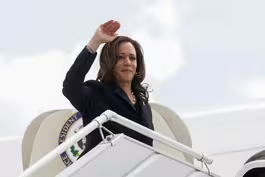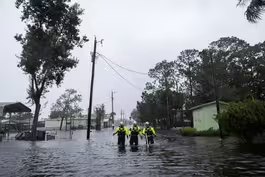
The data fueling investor concerns as stocks plunge
Clip: 8/5/2024 | 4m 34sVideo has Closed Captions
The data fueling investor concerns as stocks plunge on recession fears
Global markets have plunged on fears that the world’s strongest economy, the United States, may be slowing down. U.S. Stocks also fell with all three indexes recording losses. To discuss what happened and what it means, Amna Nawaz spoke with David Wessel, director of the Hutchins Center on Fiscal and Monetary Policy at the Brookings Institution.
Problems playing video? | Closed Captioning Feedback
Problems playing video? | Closed Captioning Feedback
Major corporate funding for the PBS News Hour is provided by BDO, BNSF, Consumer Cellular, American Cruise Lines, and Raymond James. Funding for the PBS NewsHour Weekend is provided by...

The data fueling investor concerns as stocks plunge
Clip: 8/5/2024 | 4m 34sVideo has Closed Captions
Global markets have plunged on fears that the world’s strongest economy, the United States, may be slowing down. U.S. Stocks also fell with all three indexes recording losses. To discuss what happened and what it means, Amna Nawaz spoke with David Wessel, director of the Hutchins Center on Fiscal and Monetary Policy at the Brookings Institution.
Problems playing video? | Closed Captioning Feedback
How to Watch PBS News Hour
PBS News Hour is available to stream on pbs.org and the free PBS App, available on iPhone, Apple TV, Android TV, Android smartphones, Amazon Fire TV, Amazon Fire Tablet, Roku, Samsung Smart TV, and Vizio.
Providing Support for PBS.org
Learn Moreabout PBS online sponsorshipAMNA NAWAZ: And in other major business news, global markets started the week in a tailspin amid concerns that the U.S. economy could be sliding towards a recession.
On Wall Street, the Dow Jones industrial average had its worst day in nearly two years, dropping more than 1,000 points.
The Nasdaq lost more than 500 points on the day.
The S&P 500 dropped 160 points, or exactly 3 percent.
Globally, the Japanese stock market dropped more than 12 percent, its biggest percentage drop since the late 1980s, while sell-offs spread to other markets in Asia and Europe, which are facing slowdowns of their own.
To discuss what this means, I'm joined now by David Wessel.
He's director of the Hutchins Center on Fiscal and Monetary Policy at the Brookings Institution.
David, welcome back.
Good to see you.
So why that sudden plunge in global markets overnight?
What was fueling that?
DAVID WESSEL, Brookings Institution: Well, it's always hard to say why the mood shifted and, when it does, why everybody seems to go in the same direction at once.
But there are a couple of things we know.
One is, a lot of people, a lot of big firms apparently have borrowed money in Japan at zero percent interest rates and invested that outside of Japan.
Japan surprised people by beginning to raise interest rates last week, and a lot of those people seem to have been caught short and had to sell stuff.
And when they all sell at once, you see what happens.
But as you mentioned, also the recent signals about the U.S. economy have been a bit discouraging.
The jobs market report last Friday shows some weakening.
Corporate earnings have been signaling that demand is slowing.
So I think those two things combined.
Why it happens today, who knows.
And then the backdrop is that the prospect of wider war in the Middle East can't help people's spirits and make them more confident about the future.
AMNA NAWAZ: And those data points you mentioned, the weaker-than-expected jobs report in July, also an employment rate jumping to 4.3 percent triggered fears of a potential U.S. recession, as we noted.
Are those fears overblown or are they justified right now?
DAVID WESSEL: I think the odds of a recession have gone up, but I still don't think it's those most likely outcome.
It's very easy to get freaked out when the market does something like it did today and say, what do they know, and is the end of the recovery at hand.
But the economy has still been pretty strong.
Employers still have been hiring.
And I don't think that there are signs of a recession yet.
The question is, is the economy slowing more quickly than the Fed expected and is the Fed behind the curve?
They didn't raise interest rates at their meeting last week.
And a lot of people think now that was a mistake.
AMNA NAWAZ: When you look at the impact on the tech markets in particular, there were some of the worst performers on the day today.
Nvidia fell over 5 percent.
Apple took a hit after Warren Buffett's Berkshire Hathaway sold off half of its Apple stock.
What's going on in the tech industry in particular, and why are they hurting the most?
DAVID WESSEL: Well, they're hurting the most, but, remember, they had a huge climb.
So you mentioned Nvidia.
Nvidia stock -- they make these fancy semiconductor chicks used in A.I.
It's down 20 percent in the past month, but it's still more than double what it was a year ago.
The Meta, the Facebook, lost 12 percent last month.
It's up 50 percent over the last year.
A couple of things are going on.
One is, they got -- the tech bubble -- it seems like a bubble -- got a little bit out of hand.
So they climbed a mountain.
They have now -- the stock prices have now come down the mountain, but they're not back to where they were.
Secondly, there's a little less euphoria about the immediate benefits of A.I.
I think people thought it was going to change everything right away, and the companies that are in that business were going to just be printing money, and now people have gotten a little more realistic.
AMNA NAWAZ: David, in about 30 seconds I have left, every day, investors who look at this and are worried about their retirement savings or other investments, should they do anything right now?
DAVID WESSEL: I think the right thing to do now is nothing.
A day like this is absolutely the worst time to make big decisions to buy or sell.
But it's a reminder that the stock market goes up and the stock market goes down.
So people who are in retirement or saving for a house or expect to send their kids to college in the next year or two, it's not a good idea to have all your savings in stocks.
AMNA NAWAZ: David Wessel of the Hutchins Center at the Brookings Institution.
David, always good to see you.
Thank you.
DAVID WESSEL: You're welcome.
Anti-immigrant protesters wreak havoc in across England
Video has Closed Captions
Clip: 8/5/2024 | 5m | Hundreds arrested as anti-immigrant protesters wreak havoc in across England (5m)
Black women in Georgia on key election issues, Harris' bid
Video has Closed Captions
Clip: 8/5/2024 | 7m 30s | Black women in Georgia discuss their key election issues and Harris' historic campaign (7m 30s)
Debby lashes Florida, brings threat of historic rainfall
Video has Closed Captions
Clip: 8/5/2024 | 3m 19s | Hurricane Debby lashes Florida's coast and brings potential for historic rainfall inland (3m 19s)
Inside a Lebanon refugee camp where Hamas is gaining support
Video has Closed Captions
Clip: 8/5/2024 | 7m 43s | Inside a Palestinian refugee camp in Lebanon where Hamas is gaining popularity amid war (7m 43s)
Judge rules Google broke laws to maintain search monopoly
Video has Closed Captions
Clip: 8/5/2024 | 4m 45s | Judge rules Google broke antitrust laws to maintain search monopoly (4m 45s)
Olympian Allyson Felix on supporting athletes with children
Video has Closed Captions
Clip: 8/5/2024 | 5m 38s | How Olympian Allyson Felix is changing the narrative around mothers competing (5m 38s)
Tamara Keith and Amy Walter on Harris' running mate decision
Video has Closed Captions
Clip: 8/5/2024 | 8m 42s | Tamara Keith and Amy Walter on the importance of Harris' running mate decision (8m 42s)
Providing Support for PBS.org
Learn Moreabout PBS online sponsorship
- News and Public Affairs

FRONTLINE is investigative journalism that questions, explains and changes our world.

- News and Public Affairs

Amanpour and Company features conversations with leaders and decision makers.












Support for PBS provided by:
Major corporate funding for the PBS News Hour is provided by BDO, BNSF, Consumer Cellular, American Cruise Lines, and Raymond James. Funding for the PBS NewsHour Weekend is provided by...







